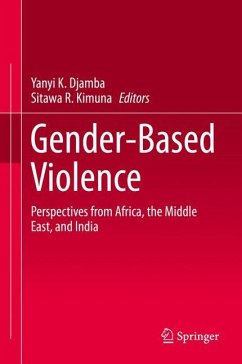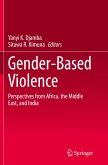This book offers new perspectives on gender-based violence in three regions where the subject has been taboo in everyday discourse often due to patriarchal cultural norms that limit women's autonomy. The contributions to this book provide rare insight into not only the levels and the socio-demographic determinants of domestic violence, but topics ranging from men's attitudes toward wife beating; domestic violence-related adolescent deaths, and women's health problems due to sexual and physical abuse. With a comprehensive introduction that provides a comparative international research framework for discussing gender-based violence in these three unique regions, this volume provides a key basis for understanding gender-based violence on a more global level.
Part I, on Africa, covers men's attitudes towards domestic violence, the impact of poverty and fertility, the association between adolescent deaths and domestic violence, and the link between domestic abuse and HIV.
Part II, on the Middle East, covers the importance of consanguinity on domestic violence in Egypt and Jordan, the effects of physical abuse on reproductive health, and the link between political unrests and women's experience and attitudes towards domestic violence.
Part III, on India, shows how sexual abuse puts women at risk of reproductive tract infections and sexually transmitted infections, as well as the role of gender norms in wife abuse and the role of youth aggressive behavior in nonconsensual sex.
With such a deep and broad coverage of factors of intimate partner abuse, this book serves as a reference document for researchers, decision-makers, and organizations that are searching for ways to reduce gender-based domestic violence. This book is of interest for researchers in Criminology and Criminal Justice, as well as Sociology, Social Work, Public Health and Human Rights.
Part I, on Africa, covers men's attitudes towards domestic violence, the impact of poverty and fertility, the association between adolescent deaths and domestic violence, and the link between domestic abuse and HIV.
Part II, on the Middle East, covers the importance of consanguinity on domestic violence in Egypt and Jordan, the effects of physical abuse on reproductive health, and the link between political unrests and women's experience and attitudes towards domestic violence.
Part III, on India, shows how sexual abuse puts women at risk of reproductive tract infections and sexually transmitted infections, as well as the role of gender norms in wife abuse and the role of youth aggressive behavior in nonconsensual sex.
With such a deep and broad coverage of factors of intimate partner abuse, this book serves as a reference document for researchers, decision-makers, and organizations that are searching for ways to reduce gender-based domestic violence. This book is of interest for researchers in Criminology and Criminal Justice, as well as Sociology, Social Work, Public Health and Human Rights.









